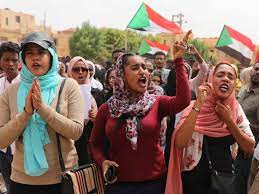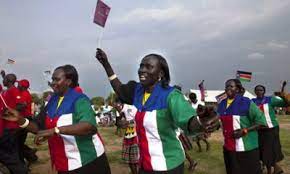Crisis in Sudan, War, Hunger and Other Insecurities
- Ayush Upadhyay
- Mar 17, 2024
- 4 min read

The Republic of the Sudan is a country in Northeast Africa. The country has faced many problems over the years. In 2019 the dictator Omar al Bashir was removed from power after protests throughout the country. Bashir’s rule was marked by violent conflict throughout the country. To secure his rule Bashir prevented the emergence of any power groupings in Sudan by keeping the armed forces occupied in domestic conflicts. In this manner, the security of Bashir’s regime was in contestation with the security of the Sudanese people many of whom perished in the conflict.
It has been a tendency in the Western discourse to portray African countries as being ‘inherently problematic’. Many of these countries are essentialized as ‘tin pot dictatorships’ and as being conflict-ridden. A post-colonial analysis emphasizes historicizing the issues rather than essentializing them. In Sudan’s case, it's important to keep in mind the country’s colonial history. The British under their rule (1899-1956) implemented a policy of ‘divide and rule’. North Sudan was portrayed as a Muslim, Arabic-speaking place. While South Sudan was shown as a much different, multi-religious, multi-ethnic, multilingual region. The practice of racializing on these bases created social hierarchies. Also, differential economic policies made the differences more pronounced. This led to cleavages being drawn between the North and the South.
In the post-colonial analysis, the referent object is the post-colonial state while the threat objects are the former colonizing states or other international organizations. In traditional International Relations approaches a war-peace dichotomy (Shephard 2009) This dichotomy leads countries like the United States to look at war as a problem that must be solved. In Sudan’s case, this was attempted by instituting the Addis Ababa peace negotiations. But this approach didn’t succeed. This was because other factors like the fractures within the Sudanese society were not properly addressed. Instead, the focus was on stabilizing Sudan by casting the country in the mould of the Westphalian State. Even this met with a setback when South Sudan broke away to be an independent state in 2011.

The US has used economic sanctions to stop hostilities between the Rapid Support Forces (RSF) and the Sudanese Armed Forces (SAF). Both are responsible for committing massacres in various regions of the country. A prominent example is the massacre in Darfur (UNHCR 2024) But while the US aims to reduce hostilities by using sanctions, it ends up hurting the local people by worsening food insecurity. When the US lifted the sanctions, the prerequisite concessions made to the IMF and the World Bank were such that it made the food inflation worse. Here we observe that food security and security from military conflict become contesting issues in the sanction regime.

Then there is the feminist approach to security. Here the individuals, women, are often the referent object. The threat objects are the patriarchal structures. A union of both the postcolonial and the feminist approach is very important as gender and race are “articulated categories” (McClintock 2013) As Anne McClintock says, these categories like race and gender - “are not distinct realms of experience, existing in splendid isolation from each other, nor can they simply be yoked together retrospectively. Rather they come into existence in and through relation to each other, if in contradictory and conflictual ways.” (McClintock 2013) This is also evident in the case of Sudan where women are subjected to a “double burden” (Shepherd 2009) The Sudanese society has patriarchal structures that bring immense hardships for women. This could be seen with the example of customary laws which allow practices like ‘Bride price’ which leads to the exploitation of women (Mai 8) While normally education is considered a silver bullet here the colonial experience has limited the benefits for educated women in the administration. This is because most of the women are educated in Arabic while the official language is English. This limits the participation of women in policymaking in an environment where women's contributions are already considered “trivial” (Mai 9) Lastly, in Sudan’s case we must move away from the assumptions of the essentialist theory. These assumptions present women as perpetually weak and in need of protection (Shepherd 2008) However, Sudan’s case shows that this is not necessarily the case. Women have participated more actively than men against various regimes and they have also participated in peace negotiations (Mustasa 2017)
To conclude- Both the feminist lenses and the post-colonial lenses are ‘not just about explaining but about changing’ (“Feminism and Postcolonialism: The Twain Shall Meet.”) For a nation like Sudan, traditional approaches to security are not adequate. Newer challenges like climate change require better approaches that do not overlook individuals or the daily lives of people. The war-peace dichotomy ignores other phases that require attention as well. Africa has been subjected to both colonialism and contemporary interventionism. To mitigate issues arising from these, the approach used for analysis must take into positionality, multiple perspectives, and the power of knowledge; as J Anne Tickner talks about in the dialogue with Parashar (“Feminism and Postcolonialism: The Twain Shall Meet,” October 1, 2016.)
REFERENCES
· “Sudan Crisis Explained,” n.d. https://www.unrefugees.org/news/sudan-crisis-explained/.
· Anon. 2016. Feminism and Postcolonialism: The Twain Shall Meet. Postcolonial Studies 19, Nr. 4 (1. October): 463–477. doi:10.1080/13688790.2016.1317583, https://doi.org/10.1080/13688790.2016.1317583.
· Idris, Amir. "Rethinking identity, citizenship, and violence in Sudan." International Journal of Middle East Studies 44, no. 2 (2012): 324-326
· Mai, Nyathon James Hoth, and Nyathon James. Role of Women in Peacebuilding in South Sudan. Sudd Institute., 2022.
· McClintock, Anne. Imperial leather: Race, gender, and sexuality in the colonial contest. Routledge, 2013.
· Mutasa, Charles, and Kudrat Virk. "Building peace in South Sudan: Progress, problems and prospects." (2017).
· Origins. “Sudan in Crisis,” June 1, 2019. https://origins.osu.edu/article/sudan-darfur-al-bashir-colonial-protest?language_content_entity=en.









Comments